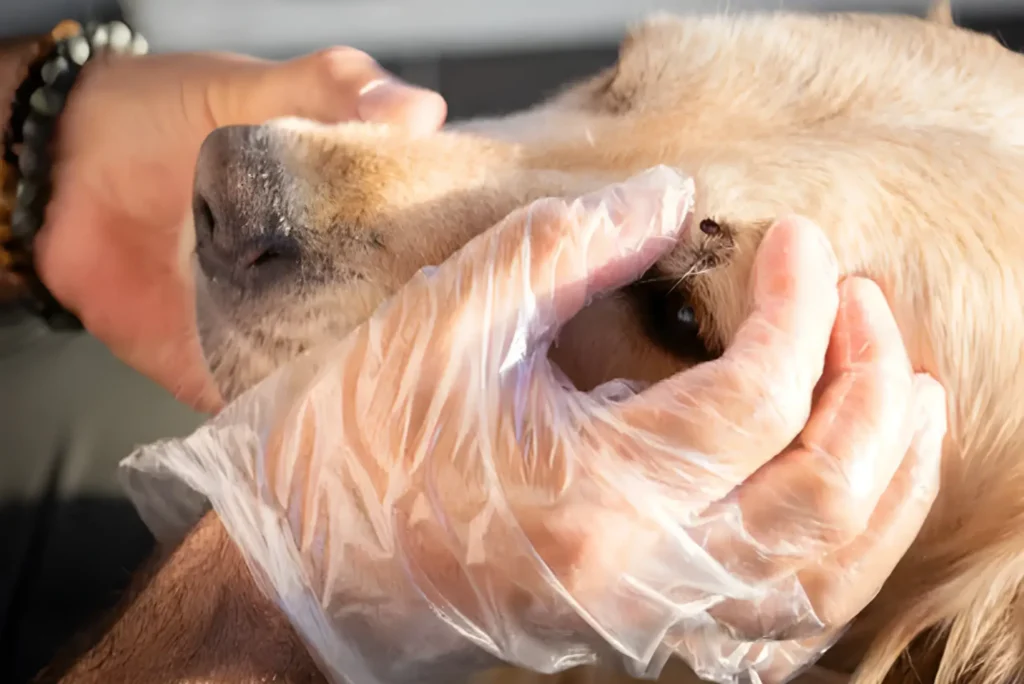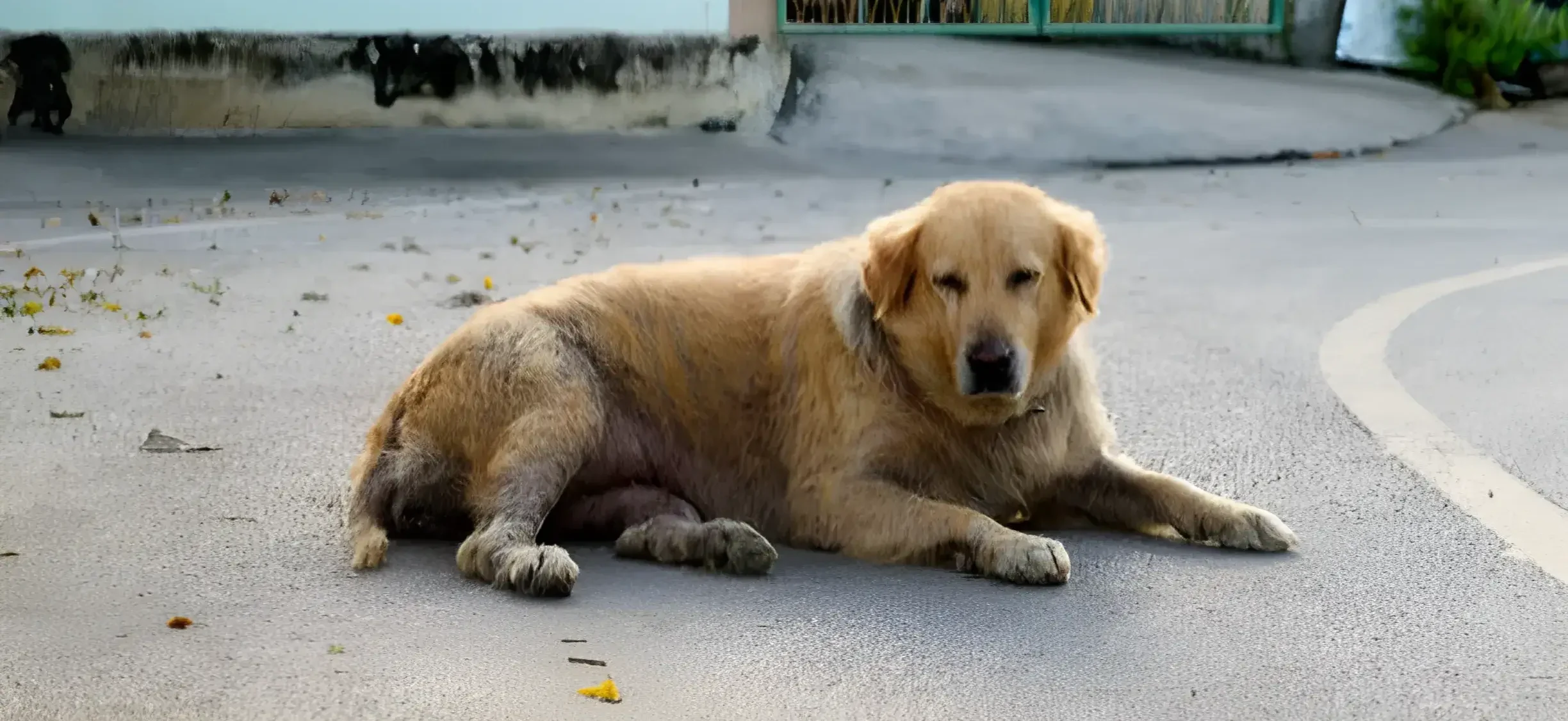Golden retrievers, with their lustrous coats and joyful demeanor, are beloved companions. Unfortunately, their breed makes them susceptible to various skin conditions. Understanding these diseases is key for keeping your Golden healthy and happy.
The Golden Retriever “Double-Coat” Dilemma
While beautiful, a Golden’s thick undercoat and longer outer coat create a perfect environment for problems to hide. Matted fur, moist skin folds, and a dense undercoat make it hard to spot infections or rashes early on. This means regular skin checks under that gorgeous fur are crucial.
The Usual Suspects: Allergies, Infections, and Parasites
Allergies: The Itchy Culprit: Environmental allergies (pollens, dust mites) and food allergies are major players in Golden Retriever skin woes. Itching, relentless scratching, inflamed ears, and even hair loss around the paws and face are common signs.
Infections: Bacteria and Yeast’s Favorite Playground: Warm, moist areas like ear canals, between toes, or armpits are breeding grounds for itchy bacterial and yeast infections. Odors, redness, discharge, and constant licking are clues.
Parasites: Unwelcome Guests: Fleas, ticks, and mites love a Golden’s dense coat. Flea bites trigger intense itching, while ticks can transmit diseases and mites can cause hair loss and crusty skin.
Less Common, But Important
Ichthyosis: When Skin Gets Scaly: This genetic condition leaves skin dry, flaky, and sometimes thickened. While manageable, it requires ongoing care.
Hormonal Imbalances: Hair Loss and More: Thyroid problems, adrenal disease – these can manifest as skin issues alongside other symptoms, so careful vet diagnosis is crucial.
Autoimmune Diseases: When the Body Attacks Itself: Rarer conditions where the immune system attacks healthy skin cells can cause blisters, sores, and requires specialized treatment.
Spotting the Signs: What to Look For

Beyond the Itch: Hot spots (raw, red patches), greasy or odorous skin, hair loss, scabs, or changes in skin color or texture all warrant concern.
Behavior Changes: Excessive licking, biting at themselves, or rubbing against furniture can signal skin discomfort.
Partnering with Your Veterinarian
Don’t try to self-diagnose your Golden’s skin issue. Your vet is essential for pinpointing the cause and tailoring the best treatment. Here’s what they might do:
- Thorough Examination: Going beyond what you see on the surface.
- Testing: Skin scrapings, allergy tests, bloodwork for underlying diseases.
- Targeted Treatment: This could range from allergy medication and immunotherapy to specialized baths, topical ointments, or treatment for internal problems.
The Power of Prevention
- Quality Nutrition: A balanced diet supports healthy skin from the inside out.
- Grooming is Key: Brushing prevents mats, bathing (not too often!) removes irritants, and allows you to check their skin routinely.
- Stay Ahead of Pests: Flea and tick prevention isn’t optional, it’s vital for skin health!
- Don’t Delay Checkups: Regular vet visits can catch problems before they become severe.
My Golden Has This… Now What?
| Symptom(s) | Possible Causes | What to Do |
|---|---|---|
| Hair loss, itching, skin changes (texture, color) | Ichthyosis | Consult your vet for diagnosis and management |
| Allergies | Consult your vet for testing and treatment options | |
| Hormone issues | Consult your vet for diagnosis and treatment | |
| Parasites | Consult your vet for diagnosis and treatment | |
| Skin infection | Consult your vet for diagnosis and treatment | |
| Localized redness, itching, sometimes hair loss | Hot spot | See your vet, may need treatment |
| Bug bite | Monitor closely, consult your vet if worsens | |
| Allergy | Monitor closely, consult your vet if worsens | |
| Injury | Monitor closely, consult your vet if worsens | |
| Greasy skin, odor, sometimes hair loss | Yeast infection | Consult your vet for diagnosis and treatment |
| Bacterial infection | Consult your vet for diagnosis and treatment | |
| Allergies | Consult your vet for testing and treatment options |
Golden Retriever Grooming: Keeping That Coat Healthy and Skin Happy
Goldens are known for their beautiful coats, but keeping them in top shape takes some special attention. Here’s your routine for preventing skin issues and maintaining that Golden glow:
Brush Up on Brushing: Aim for at least twice-weekly brushing sessions. This detangles hair preventing mats that can trap moisture against the skin. It’s also your chance to do a skin check! Use a slicker brush for the outer fur, and an undercoat rake to gently thin out the dense inner layer.
Bath Time Basics: Most Goldens don’t need baths more than every 6-8 weeks. Too much bathing strips natural oils, leaving their skin vulnerable. Always use a vet-recommended, gentle dog shampoo.
The Drying Dilemma: A Golden’s undercoat is like a super absorbent sponge! Simple towel drying won’t cut it. Use a blow dryer on a cool or low heat setting to thoroughly dry the fur, brushing as you go to prevent matting.
Problem Areas: Pay extra attention to ears, armpits, the base of the tail, and between toes– these spots are prone to trapping moisture. Dry them extra carefully after baths and check them regularly.
Trimming Talk: While not essential, keeping fur trimmed around the feet and sanitary areas makes cleanup easier and can reduce smells. If you’re not confident, ask your groomer or vet to demonstrate the best techniques.
Busting Skin Myths
With so much information online, it’s easy to fall for misconceptions about Golden Retriever skin care. Here are a few to avoid:
Myth: Golden Retrievers need frequent baths.
Truth: Bathing too often can disrupt their skin’s natural oils, increasing dryness and irritation risks.
Myth: Shaving your Golden Retriever will keep them cooler.
Truth: A Golden’s double coat acts as insulation, helping regulate their temperature. Shaving can disrupt this process and increase their risk of sunburn and bug bites.
Myth: Coconut oil cures all skin problems.
Truth: While coconut oil can be a mild moisturizer, it’s not a cure-all for infections, allergies, or other skin diseases. Always consult your vet before using it on irritated skin.
Your Golden’s Skin Champion
By combining proactive grooming, staying attuned to any skin changes, and working closely with your veterinarian, you can ensure your Golden Retriever’s skin and coat remain healthy, comfortable, and beautiful!
The photo featured below the post headline is Credit: Mumemories/istockphoto
I hope you find this post helpful and informative. If Yes’ feel free to share it with your friends!
Frequently Asked Question
Can I soothe my Golden’s itchy skin at home?
Cool compresses may offer temporary relief, but always consult your vet before using any over-the-counter product. Some ingredients can worsen the problem or mask symptoms your vet needs to see.
Will my Golden Retriever outgrow their skin problems?
Unfortunately, issues like allergies and ichthyosis typically require lifelong management. Early veterinary intervention is key to keeping symptoms under control and your Golden comfortable.
Is it serious if my Golden Retriever has skin issues?
While some are mild, untreated skin diseases can lead to pain, infections, and affect your dog’s overall quality of life. Seeking timely veterinary care is essential.
How can I prevent skin problems in my Golden Retriever?
A balanced diet, regular grooming, routine vet checkups, and year-round flea and tick prevention go a long way in protecting your Golden’s skin health.
My Golden Retriever has dandruff, what should I do?
Dandruff can point to dry skin, allergies, or other issues. Don’t just try to treat the flakes, have your vet investigate the root cause so it can be properly addressed.
Are Golden Retrievers prone to yeast infections?
Yes, their dense coats and floppy ears can create warm, moist environments where yeast can thrive. If you notice a musty smell, greasy skin, or excessive scratching, consult your vet.
Can Golden Retrievers have food allergies that affect their skin?
Absolutely! Food allergies often manifest as itchy skin, ear problems, and sometimes digestive upset. Your vet may recommend a food trial to pinpoint any dietary triggers.
How often should I bathe my Golden Retriever with skin problems?
Your veterinarian will offer the best advice based on the underlying cause. Overbathing can be harmful, so always follow their guidance.
Will shaving my Golden Retriever help with their skin allergies?
No, shaving can disrupt your Golden’s natural temperature regulation and make them more susceptible to sunburn and bug bites. Talk to your vet about appropriate allergy management.
I found a tick on my Golden Retriever, what should I do?
Safely remove the tick using a tick remover or have your vet do it. Monitor your Golden for any signs of illness, as ticks can transmit diseases.
My Golden Retriever’s skin seems darker than usual, is this normal?
Changes in skin color can sometimes accompany allergies, infections, or hormone imbalances. It’s always wise to have your vet investigate changes like this to rule out any underlying medical concerns.
Are there home remedies for hot spots on Golden Retrievers?
While mild hot spots may respond to cleaning and keeping the area dry, many cases require veterinary treatment to prevent infection and address the underlying cause. Don’t hesitate to seek help!

